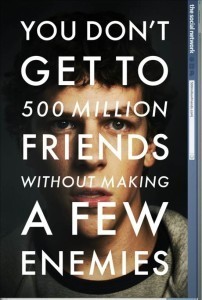The Social Network: Missing the Connection on the Digital Revolution
 The Social Network is an extraordinarily well-made film in technical terms. Alas, this competency cannot hide the movie's glaring problem – the fact that it is not actually about any of the events it is describing. The internet-disliking Aaron Sorkin wrote a tragic friendship/courtroom drama without connecting it to the realities of the digital revolution. It is a very well done tragic friendship/courtroom drama, but the greatness, terror, and breadth of what Facebook created are only broached as sideshow devices in the evolution of the personal tragedy.
The Social Network is an extraordinarily well-made film in technical terms. Alas, this competency cannot hide the movie's glaring problem – the fact that it is not actually about any of the events it is describing. The internet-disliking Aaron Sorkin wrote a tragic friendship/courtroom drama without connecting it to the realities of the digital revolution. It is a very well done tragic friendship/courtroom drama, but the greatness, terror, and breadth of what Facebook created are only broached as sideshow devices in the evolution of the personal tragedy.
Saying that Mark Zuckerberg or Sean Parker were driven to make Facebook or Napster out of a deep need to be accepted ignores the tremendous forces they were engaging. Zuckerberg and Parker were intelligent people who managed to subvert identity, information, ownership, and even capitalism itself. In addition to their personal flaws they also had some serious things on their minds. Zuckerberg had real intellectual reasons for unleashing what he created, concrete beliefs about how privacy needed to be redefined, how the Internet should be used, and how people are supposed to connect in a free society. You or I may disagree with them, but these thoughts were driving the development of Facebook. He was not acting blindly out of insecure dork-rage. Mark Zuckerberg knew what he was doing, which may actually make him worse, or better, or more sinister.
The Social Network is best and closest to brilliance when it portrays Mr. Zuckerberg as an anti-hero crusader, dropping the tragedy act and displaying him as a force on the wind, using his rough edge to tear down structures that might just deserve it (i.e. Larry Summers' Harvard). It also contains the all-too-often dropped thread of showing the crass misogyny, sexism, and backwards gender roles endemic at the far end of the bell-curve. That even in a world where women out-earn and out-test men, the movers and shakers at the very top are still predominately male. None of the entrepreneurs, or geniuses, or programmers, or high-achieving anti-heroes portrayed in the film are women. The closest we get is a bright young lawyer and a Victoria's Secret model who needs shots if business is going discussed while she is sitting at the table. This speaks volumes.
We as a society do not raise our daughters to be rebels. We do not instill in them the need to challenge the rules and demolish barriers based on the glory of their own ideas, even in the face of their own self-immolation. We are not teaching them to tear down the walls.
You may think that Mark Zuckerberg built a time-wasting plague on human interaction that is ruining your children or you might believe that he is a genius prophet of modernity. You might consider both simultaneously. It is too bad the film does not contain this larger discussion within its narrative. But either way, he changed the world, and if no real lessons about what Facebook has done to us can be taken from the The Social Network, at least we can take away some truths about human achievement. The two most successful people who ever attended Harvard were both dropouts. This is not an accident. If only we let our children, especially our daughters, be that bold. And if only we let them be that flawed.



